An excerpt from the Annual Report of the Commissioner of Indian Affairs to the Secretary of the Interior for the fiscal year ending 1899, containing the Twentieth Annual Report of the Carlisle Indian Industrial School. The report, submitted by Superintendent Richard Henry Pratt, includes a school population table and discussions of the school's…
BIA Policy and Policy Changes
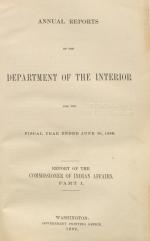
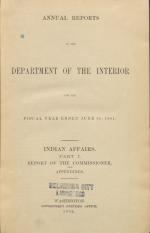
An excerpt from the Annual Report of the Commissioner of Indian Affairs to the Secretary of the Interior for the fiscal year ending 1901, containing the Twenty-Second Annual Report of the Carlisle Indian Industrial School. The report, submitted by Superintendent Richard Henry Pratt, includes a school population table and discussions of…
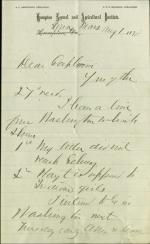
Samuel Chapman Armstrong informs Richard Henry Pratt that he has received a telegram from Washington, indicating that a previously sent letter was not received and that Commissioner of Indian Affairs Ezra Hayt is opposed to educating Indian girls. Armstrong notes that he will go to Washington to discuss the matter in person.
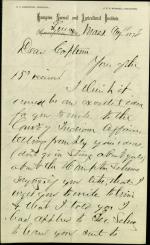
Samuel Chapman Armstrong writes to Richard Henry Pratt encouraging him to write to Commissioner of Indian Affairs Ezra Hayt to share Pratt's ideas about an Indian school. Armstrong provides some advice to Pratt about downplaying Pratt's views about Indian girls' education, how to find political allies in Washington, and how to play towards Hayt…
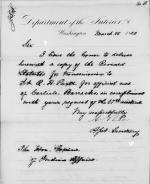
Assistant Secretary of the Interior A. Bell sends a copy of the Revised Statutes to the Commissioner of Indian Affairs and asks the Commissioner to forward it to Richard Henry Pratt at the Carlisle Indian School.
Note: This item was copied from U.S. National Archives microfilm reels (M234), which were filmed from the original documents…
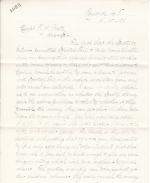
W. J. Cleveland writes to Richard Henry Pratt seeking clarification on the government's policy in regards to sending children home prior to their term of enrollment ending. Cleveland writes that since Spotted Tail was given permission to pay the expenses in returning his children home others have inquired if they are also able to do so. Pratt…
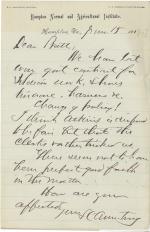
Samuel Chapman Armstrong of the Hampton Institute writes to Richard Henry Pratt informing him that Hampton's contract to supply student-made industrial products has been cancelled due to a policy change by Commissioner of Indian Affairs Atkins.
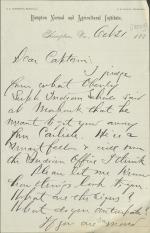
Samuel Chapman Armstrong of the Hampton Institute writes to Richard Henry Pratt discussing Superintendent of Indian Schools John Henry Oberly's recent comments at the Mohonk Conference, suggesting that Oberly will become the Commissioner of Indian Affairs eventually and discussing President Cleveland's Indian policy.
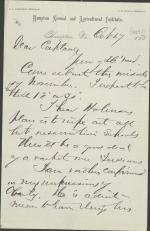
Samuel Chapman Armstrong of the Hampton Institute writes to Richard Henry Pratt discussing his professional network, including news on a plan to eliminate boarding schools in favor of reservation schools and a trip to Philadelphia.
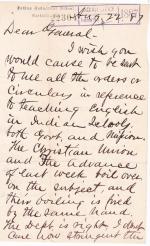
Richard Henry Pratt requests from the Office of Indian Affairs that all circulars referencing teaching English in Indian Schools be sent to him due to articles in the Christian Union and The Advance.
Pratt also writes that the bids on the building surprised him and that office should be pleased.
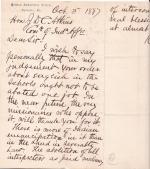
Richard Henry Pratt writes to the Office of Indian Affairs that he agrees with the office's order regarding English in the schools. He notes his disagreement with the missionaries who oppose it. He ends by noting that teaching English will lead to greater emancipation and eliminate interpreters at agencies which would be highly beneficial.
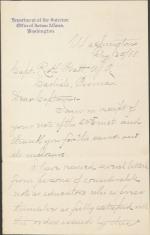
Commissioner of Indian Affairs John D. C. Atkins writes to Richard Henry Pratt, informing him that numerous educators have written to the Office of Indian Affairs supporting their recent orders related to the teaching of "the Indian language."
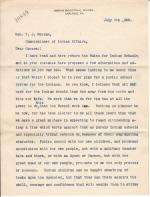
Richard Henry Pratt returns the Rules for Indian Schools with a few recommendations. Pratt's main recommendation is that students should be as strongly encouraged as possible to enter the general public school system rather than establishing a separate Indian public school system. In addition, Pratt recommends an equal proportion of sexes at…
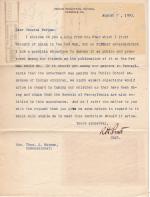
Richard Henry Pratt forwards a clip from the Washington Evening Star regarding a policy change that the Office of Indian Affairs will pay $10 per quarter for Indian students attending public schools. Pratt notes that he was going to publish this clip in the school newspaper but refrained due to fear that patrons would object to taking Carlisle…

Richard Henry Pratt provides comments to an Office of Indian Affairs letter regarding the various textbooks and education curriculum at the Carlisle Indian School and how it relates to the proposal of the Office for Indian Schools.
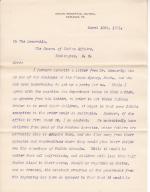
Richard Henry Pratt forwards a letter from Henry A. Kennerly regarding an order from the Commissioner of Indian Affairs that discouraged the transfer of mixed blood students to Carlisle. Kennerly notes that unless this order is modified he could not come up with a party of students.
Pratt adds that while he agrees with the sentiment of…
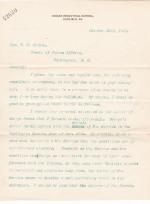
Richard Henry Pratt writes to Thomas J. Morgan informing him that he is printing the rules and regulations for enforcing compulsory attendance in the Red Man. In addition, Pratt writes of a letter of former student George Means that he is forwarding officially under separate cover. Means writes concerning the article published by Mr.…
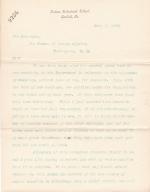
Richard Henry Pratt proposes to the Office of Indian Affairs that teachers in the Indian Service be paid to attend a summer school in addition to their one month of paid leave.
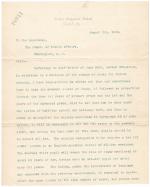
Richard Henry Pratt responds to an Office of Indian Affairs letter in reference to a revision in the course of study for Indian schools. Pratt details the current course of study at the Carlisle Indian School and notes that the change in policy would require an additional two years of study. In addition, he notes that many reservation and…
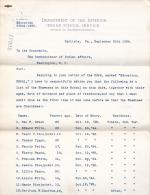
Richard Henry Pratt provides a list of the members of the Shawnee Nation currently enrolled at the Carlisle Indian School to the Office of Indian Affairs.
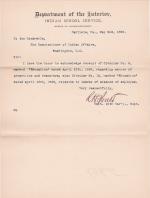
Richard Henry Pratt forwards a letter to the Commissioner of Indian Affairs acknowledging receipt of Circulars number 9 and 10 concerning promotions and transfers and employee leaves of absence.
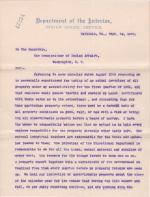
Richard Henry Pratt requests to exempt the Carlisle Indian School from the Office of Indian Affairs circular dated August 15, 1900 due to already fulfilling many of its requirements through quarterly inventories.
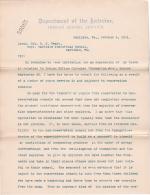
Richard Henry Pratt replies to an Office of Indian Affairs Circular No. 54 regarding transferring pupils to non-reservation schools. Pratt also encloses a letter from Edgar A. Allen on the same subject.
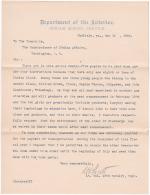
Richard Henry Pratt requests to delay implementing the order to return students with one eighth or less Indian blood until July due to limited finances and to allow three students to finish their course of enrollment.
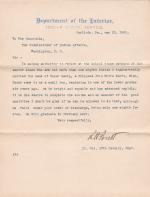
Richard Henry Pratt requests to keep Oscar Davis through February in order to allow him to graduate despite being covered by the discharge order of the Office of Indian Affairs.
